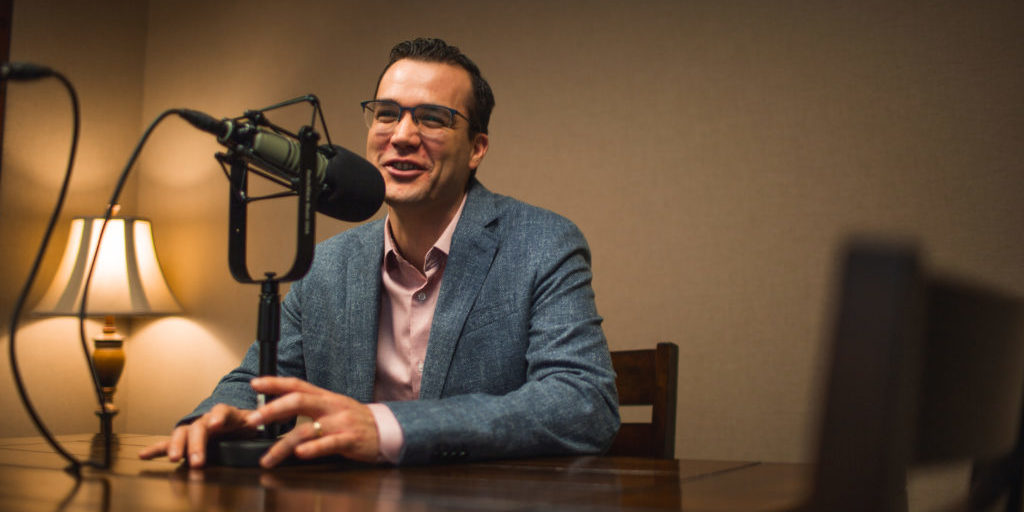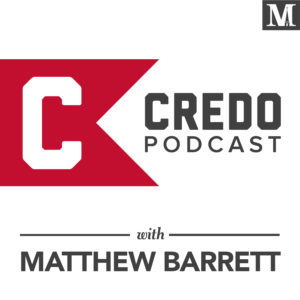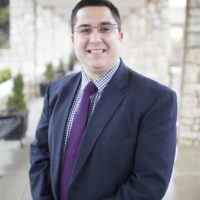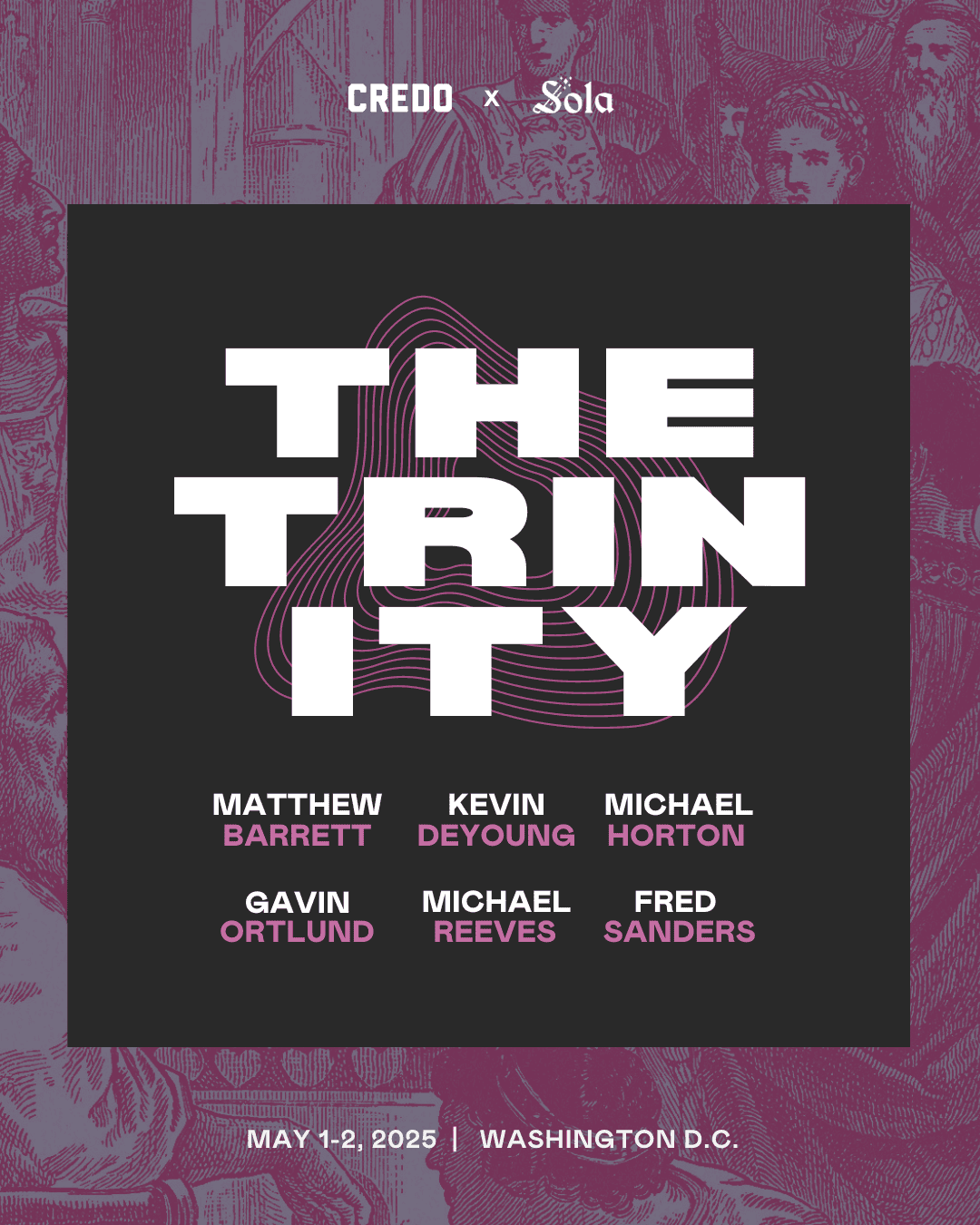
The Credo Podcast: Looking Back on 2018, Looking Forward to 2019
Founder and executive editor of  Credo Magazine and Associate Professor of Christian Theology at Midwestern Seminary, Matthew Barrett, is the host of The Credo Podcast, which launched in April of 2018. In each episode, Matthew Barrett talks with fellow theologians about the most important doctrines of the faith. The Credo podcast is available on Soundcloud as well as iTunes. If you have enjoyed the Credo podcast recently, you may be interested in many other episodes that have released since its inception. Below are the episodes released in 2018.
Credo Magazine and Associate Professor of Christian Theology at Midwestern Seminary, Matthew Barrett, is the host of The Credo Podcast, which launched in April of 2018. In each episode, Matthew Barrett talks with fellow theologians about the most important doctrines of the faith. The Credo podcast is available on Soundcloud as well as iTunes. If you have enjoyed the Credo podcast recently, you may be interested in many other episodes that have released since its inception. Below are the episodes released in 2018.
What is simplicity and does it matter?
What does it mean  for God to be unity as opposed to a God who is compounded of parts? Are God’s attributes and essence identical? How are immutability and eternity compromised if we reject simplicity? In this episode, Dr. Matthew Barrett is joined by Dr. James Dolezal to discuss divine simplicity, the attributes of God, the importance of classical theism, and why simplicity makes all the difference for a biblical understanding of the doctrine of God.
for God to be unity as opposed to a God who is compounded of parts? Are God’s attributes and essence identical? How are immutability and eternity compromised if we reject simplicity? In this episode, Dr. Matthew Barrett is joined by Dr. James Dolezal to discuss divine simplicity, the attributes of God, the importance of classical theism, and why simplicity makes all the difference for a biblical understanding of the doctrine of God.
What is eternal generation?
What does it mean for God to be triune? When the trinitarian phrase eternal generation is used, what is it referring to exactly? Why did the Fathers of the Church believe eternal generation was crucial for a biblical view of the Trinity over against heresy? In this episode, Dr. Matthew Barrett is joined by Dr. Fred Sanders to frame a robust theological understanding of one of Christianity’s most essential doctrines.
for God to be triune? When the trinitarian phrase eternal generation is used, what is it referring to exactly? Why did the Fathers of the Church believe eternal generation was crucial for a biblical view of the Trinity over against heresy? In this episode, Dr. Matthew Barrett is joined by Dr. Fred Sanders to frame a robust theological understanding of one of Christianity’s most essential doctrines.
Does God suffer?
Can God still be loving and personal if he is not susceptible to emotional change? How are we to think about God’s impassibility in light of his immutability? How can God be impassible if Christ has suffered on the cross? In this episode, Dr. Matthew Barrett is joined by Dr. Thomas Weinandy to discuss the important theological and pastoral question of whether or not God suffers.
and personal if he is not susceptible to emotional change? How are we to think about God’s impassibility in light of his immutability? How can God be impassible if Christ has suffered on the cross? In this episode, Dr. Matthew Barrett is joined by Dr. Thomas Weinandy to discuss the important theological and pastoral question of whether or not God suffers.
How Thomas Schreiner became a New Testament scholar, part 1
Why did Tom Schreiner leave the Roman Catholic Church and become a Christian? What was his experience like at Fuller Theological Seminary? What theological controversies in seminary helped him determine his theological convictions? Why was he first drawn to New Testament studies? In this episode, Dr. Matthew Barrett is joined by Dr. Thomas Schreiner to discuss his journey from an unbeliever to seminary.
leave the Roman Catholic Church and become a Christian? What was his experience like at Fuller Theological Seminary? What theological controversies in seminary helped him determine his theological convictions? Why was he first drawn to New Testament studies? In this episode, Dr. Matthew Barrett is joined by Dr. Thomas Schreiner to discuss his journey from an unbeliever to seminary.
How Thomas Schreiner became a New Testament scholar, part 2
Why did Tom Schreiner  not only become a New Testament professor but a preaching pastor? How have his writings and controversies shaped him as a New Testament scholar? Why does he believe it is important not just to study New Testament but systematic theology? How has his understanding of the sovereignty of God helped him persevere in the midst of severe, personal trials? In this episode, Dr. Matthew Barrett is joined by Dr. Thomas Schreiner to discuss his journey from seminary to being the NT scholar he is today.
not only become a New Testament professor but a preaching pastor? How have his writings and controversies shaped him as a New Testament scholar? Why does he believe it is important not just to study New Testament but systematic theology? How has his understanding of the sovereignty of God helped him persevere in the midst of severe, personal trials? In this episode, Dr. Matthew Barrett is joined by Dr. Thomas Schreiner to discuss his journey from seminary to being the NT scholar he is today.
Who invented Christianity?
Was Christianity an  invention of the 4th and 5th centuries? Is orthodox theology merely the byproduct of power struggles, so that whoever has the political upper hand decides what is heretical? Is the high view of Jesus really a minority view in the first two centuries of the church? In this episode, Dr. Matthew Barrett talks with Dr. Michael Kruger to answer some of these popular questions and objections.
invention of the 4th and 5th centuries? Is orthodox theology merely the byproduct of power struggles, so that whoever has the political upper hand decides what is heretical? Is the high view of Jesus really a minority view in the first two centuries of the church? In this episode, Dr. Matthew Barrett talks with Dr. Michael Kruger to answer some of these popular questions and objections.
How can Christ have two natures?
How do these two natures relate to one another in the one person of Christ? What is the communication of attributes and Calvin’s “extra,” and why do these concepts advance our understanding of the hypostatic union? In this episode, Dr. Matthew Barrett and Dr. Stephen Wellum dare to enter into the mystery of the person of Christ, deciphering how Christians should and should not describe the incarnation. Barrett and Wellum demonstrate why a biblical and theological understanding of Christ’s person is essential to the Christian faith and provide much-needed wisdom on how to avoid Christological heresies.
relate to one another in the one person of Christ? What is the communication of attributes and Calvin’s “extra,” and why do these concepts advance our understanding of the hypostatic union? In this episode, Dr. Matthew Barrett and Dr. Stephen Wellum dare to enter into the mystery of the person of Christ, deciphering how Christians should and should not describe the incarnation. Barrett and Wellum demonstrate why a biblical and theological understanding of Christ’s person is essential to the Christian faith and provide much-needed wisdom on how to avoid Christological heresies.
The Classical God and the Insanity of Atheism, Part 1
Is western atheism  a novel movement? How has the atheism of today misunderstood the metaphysics of the doctrine of God? Is the classical understanding of God articulated by Eastern and Western Fathers a better antidote to contemporary atheism than the modern, relational view of God? Why is the Christian God the first cause, that being who is the necessary and absolute being? Is God the ontological source of the goodness and bliss we so desperately search for? In this episode, Dr. Matthew Barrett is joined by Dr. David Bentley Hart to discuss how the classical understanding of God contributes to the conversation over contemporary atheism.
a novel movement? How has the atheism of today misunderstood the metaphysics of the doctrine of God? Is the classical understanding of God articulated by Eastern and Western Fathers a better antidote to contemporary atheism than the modern, relational view of God? Why is the Christian God the first cause, that being who is the necessary and absolute being? Is God the ontological source of the goodness and bliss we so desperately search for? In this episode, Dr. Matthew Barrett is joined by Dr. David Bentley Hart to discuss how the classical understanding of God contributes to the conversation over contemporary atheism.
The Classical God and the Insanity of Atheism, Part 2
Is western atheism a novel movement? How has the atheism of today misunderstood the metaphysics of the doctrine of God? Is the classical understanding of God articulated by Eastern and Western Fathers a better antidote to contemporary atheism than the modern, relational view of God? Why is the Christian God the first cause, that being who is the necessary and absolute being? Is God the ontological source of the goodness and bliss we so desperately search for? In this episode, Dr. Matthew Barrett is joined by Dr. David Bentley Hart to discuss how the classical understanding of God contributes to the conversation over contemporary atheism.
novel movement? How has the atheism of today misunderstood the metaphysics of the doctrine of God? Is the classical understanding of God articulated by Eastern and Western Fathers a better antidote to contemporary atheism than the modern, relational view of God? Why is the Christian God the first cause, that being who is the necessary and absolute being? Is God the ontological source of the goodness and bliss we so desperately search for? In this episode, Dr. Matthew Barrett is joined by Dr. David Bentley Hart to discuss how the classical understanding of God contributes to the conversation over contemporary atheism.
Thomas Aquinas: Friend or Foe?
Why are evangelicals so unfamiliar with one of the greatest theologians in the history of the church, Thomas Aquinas? Is Aquinas a friend or a foe to evangelicals today? Was Aquinas first and foremost a philosopher or a theologian? Is the popular assumption that Aquinas was a rationalist really true? What advantages are there to embracing a Reformed Thomism? In this episode, Dr. Matthew Barrett talks with Dr. Michael Allen to address many of the caricatures concerning Aquinas and to consider in what ways Aquinas might advance theology today.
unfamiliar with one of the greatest theologians in the history of the church, Thomas Aquinas? Is Aquinas a friend or a foe to evangelicals today? Was Aquinas first and foremost a philosopher or a theologian? Is the popular assumption that Aquinas was a rationalist really true? What advantages are there to embracing a Reformed Thomism? In this episode, Dr. Matthew Barrett talks with Dr. Michael Allen to address many of the caricatures concerning Aquinas and to consider in what ways Aquinas might advance theology today.
John Frame’s Life as a Theologian
How did John Frame first discover theology? How was his time at Princeton and Yale instrumental to his theological journey? What influence has Cornelius Van Til had on Frame and how does Frame differ in his presuppositional approach to apologetics? What does it mean to be winsomely reformed? In this episode, Dr. Matthew Barrett talks with Dr. John Frame to analyze his education, career, and writings.
first discover theology? How was his time at Princeton and Yale instrumental to his theological journey? What influence has Cornelius Van Til had on Frame and how does Frame differ in his presuppositional approach to apologetics? What does it mean to be winsomely reformed? In this episode, Dr. Matthew Barrett talks with Dr. John Frame to analyze his education, career, and writings.
Should we interpret the Bible theologically?
Is it possible to approach the text of Scripture neutral, without a theological framework? What dangers exist in neglecting theology in the exegetical process? Should creeds and confessions throughout the history of Christianity play any role in biblical interpretation? What are appropriate ways to utilize dogmatic categories in exegesis? Why are the disciplines of theology and exegesis segregated today? In this episode, Dr. Matthew Barrett is joined by Dr. Scott Swain to discuss how theology should influence our interpretation of the biblical text.
the text of Scripture neutral, without a theological framework? What dangers exist in neglecting theology in the exegetical process? Should creeds and confessions throughout the history of Christianity play any role in biblical interpretation? What are appropriate ways to utilize dogmatic categories in exegesis? Why are the disciplines of theology and exegesis segregated today? In this episode, Dr. Matthew Barrett is joined by Dr. Scott Swain to discuss how theology should influence our interpretation of the biblical text.
Union with Christ and Justification
What is the doctrine of union with Christ, and how does it relate to justification and sanctification? Does union with Christ encompass the entire order of salvation or only refer to a specific stage in the redemption process? How should we distinguish redemption accomplished and redemption applied? What eschatological aspects are present in justification? How does the category of recapitulation capture the active obedience of Christ? In this episode, Dr. Matthew Barrett is joined by Dr. Michael Horton to clarify how union with Christ relates to justification.
union with Christ, and how does it relate to justification and sanctification? Does union with Christ encompass the entire order of salvation or only refer to a specific stage in the redemption process? How should we distinguish redemption accomplished and redemption applied? What eschatological aspects are present in justification? How does the category of recapitulation capture the active obedience of Christ? In this episode, Dr. Matthew Barrett is joined by Dr. Michael Horton to clarify how union with Christ relates to justification.
What’s gone wrong with biblical interpretation?
Why does the doctrine of God matter for hermeneutics? If we reject classical theism and adopt theistic personalism, how does that change our view of inspiration? Can we follow the example of the apostles in their Christological interpretation? How has the enlightenment and methods of higher criticism affected hermeneutics today? Can divine authorial intent ever go beyond human authorial intent? Does the Bible have one meaning and what is Scripture’s plain sense? In this episode, Dr. Matthew Barrett is joined by Dr. Craig Carter to discuss how pre-modern exegesis interpreted Christ in line with the New Testament authors, and how our interpretation of Scripture is intricately connected to our doctrine of God.
of God matter for hermeneutics? If we reject classical theism and adopt theistic personalism, how does that change our view of inspiration? Can we follow the example of the apostles in their Christological interpretation? How has the enlightenment and methods of higher criticism affected hermeneutics today? Can divine authorial intent ever go beyond human authorial intent? Does the Bible have one meaning and what is Scripture’s plain sense? In this episode, Dr. Matthew Barrett is joined by Dr. Craig Carter to discuss how pre-modern exegesis interpreted Christ in line with the New Testament authors, and how our interpretation of Scripture is intricately connected to our doctrine of God.
Why must Christ obey the law?
What have the categories of active and passive obedience of Christ traditionally meant? Why is active obedience so essential to imputation and union with Christ? Why has the death of Christ overshadowed other indispensable aspects of his work? What are some of the practical and pastoral implications of Christ’s active obedience? In this episode, Dr. Matthew Barrett is joined by Dr. Brandon Crowe to consider how Christ’s entire life of obedience relates to our salvation.
of active and passive obedience of Christ traditionally meant? Why is active obedience so essential to imputation and union with Christ? Why has the death of Christ overshadowed other indispensable aspects of his work? What are some of the practical and pastoral implications of Christ’s active obedience? In this episode, Dr. Matthew Barrett is joined by Dr. Brandon Crowe to consider how Christ’s entire life of obedience relates to our salvation.
Why God hides
In what sense is God mystery? How is his transcendence and immanence displayed when he hides? Are there negative consequences to reading Christology back into the doctrine of God? How do God’s power, simplicity, and aseity relate to his incomprehensibility? Why is maintaining the distinction between the Creator and creature of such importance, particularly in framing our need for God’s grace? In this episode, Dr. Matthew Barrett is joined by Dr. Katherine Sonderegger to consider God’s hiddenness and how it simultaneously conveys his transcendence and presence.
How is his transcendence and immanence displayed when he hides? Are there negative consequences to reading Christology back into the doctrine of God? How do God’s power, simplicity, and aseity relate to his incomprehensibility? Why is maintaining the distinction between the Creator and creature of such importance, particularly in framing our need for God’s grace? In this episode, Dr. Matthew Barrett is joined by Dr. Katherine Sonderegger to consider God’s hiddenness and how it simultaneously conveys his transcendence and presence.
2019 Podcasts
If you’ve enjoyed the Credo podcast thus far, you are sure to enjoy the episodes slated for 2019. Dr. Barrett will be hosting theologians such as Paul Helm, Richard Lints, Tom Nettles, Owen Strachan, G.K. Beale, Timothy George, Mark Thompson, John Feinberg, David Dockery, Carl Trueman, J.V. Fesko, Matthew Levering, David VanDrunen, Gerald Bray, Leonardo de Chirico, Craig Bartholomew, Stephen Dempster, Joel Beeke, Gary Jenkins, Andreas Köstenberger, Kelly Kapic, Kevin DeYoung, Justo Gonzalez, Robert Kolb, Kevin Vanhoozer, Nicholas Wolterstorff, and others.

